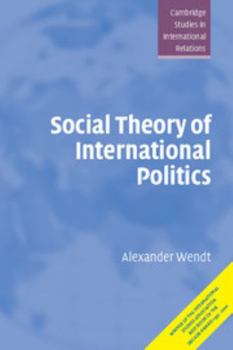Social Theory of International Politics
Select Format
Select Condition 
Book Overview
Drawing on philosophy and social theory, Social Theory of International Politics develops a cultural theory of international politics that contrasts with the realist mainstream. Wendt argues that states can view each other as enemies, rivals, or friends. He characterizes these roles as cultures of anarchy, which are shared ideas that help shape states' interests and capabilities. These cultures can change over time as ideas change. Wendt thus argues that the nature of international politics is not fixed, and that the international system is not condemned to conflict and war.
Format:Paperback
Language:English
ISBN:0521469600
ISBN13:9780521469609
Release Date:November 1999
Publisher:Cambridge University Press
Length:447 Pages
Weight:1.65 lbs.
Dimensions:0.9" x 6.0" x 8.9"
Customer Reviews
2 ratings
A bold synthesis of constructivism & realism in IR
Published by Thriftbooks.com User , 24 years ago
Alexander Wendt makes an extremely well written attempt to find common ground amongst various approaches to international relations. The first four chapters alone are worth the price of the book. While at first glance the book may seem to be of interest only to academics, his methods do bear quite interesting consequences for the way we can all view global politics. By encouraging us to think more clearly about causal and constitutive questions, readers of this book will find it of continuing relevance in understanding the way politicians, CEO's and NGO's contest and negotiate in various institutional forums over issues of critical importance. The only drawback of the book is that it does reinforce the bias, common in IR circles, of remaining silent about the extreme malleability between "politics" and "the economy". This is where constructivism comes into it's own against the stronger strands of positivist realism. That Wendt discusses corporate agency without discussing actual corporations, or more importantly, the constitutive features and problems of capitalism as a form of institutionalized power that constantly challenges the current contours of "the state" and at the same time shapes the ideational realm he scrutinizes, is, perhaps, the only drawback of this otherwise fine book.
So this is what Professor Wendt had been up to...
Published by Thriftbooks.com User , 25 years ago
Judging by the titles that overlap purchases of this book, it would appear that most readers thus far have been of the sympathetic variety.If so, it is a shame. This book deserves a wide audience. Wendt engages competing approaches with a rare sincerity. Arguing with what may be called frightening rigor, Wendt endeavors to carve a "via media" between the (falsely posed) choices of rationalism and constructivism.The extent to which he succeeds will largely be played out in ongoing debate. And this book certainly seems designed to provoke it. Wendt's defense of scientific realism - "I am a positivist" - will not sit well with some. Therein lies its greatest potential contribution: rescuing constructivism from itself. Students with substantive interests in, for example, environmental politics have long been wary of "ideas all the way down" approaches to International Politics. At least this student feels that it gives the lie to "radical" constructivism. In brief summary, those who suspect that there may be a place in IR theory for both constitutive and causal understanding will find this text to be a powerful ally.






